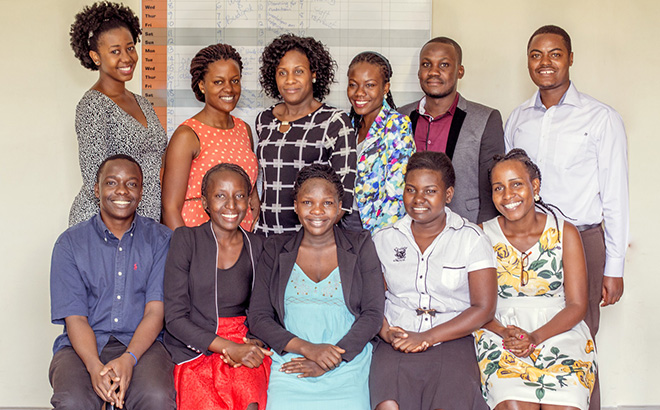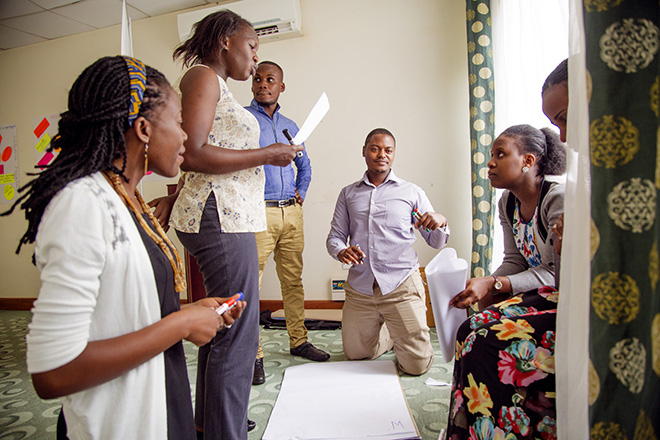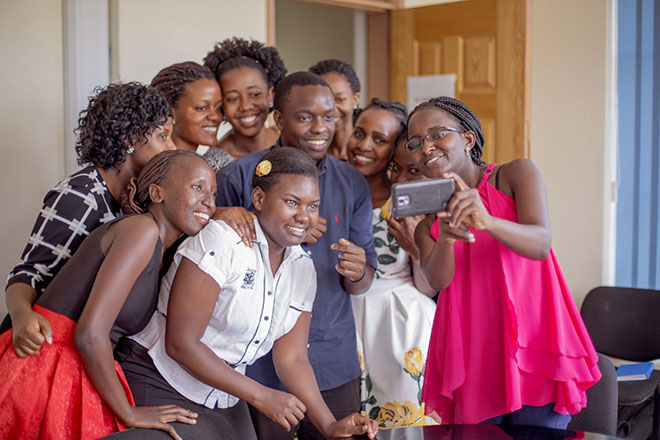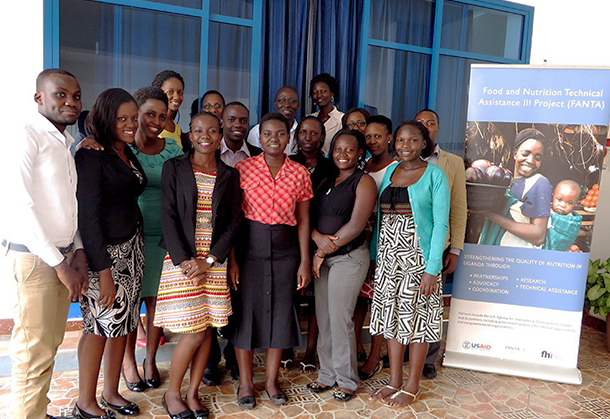
The 2015-2016 Uganda Nutrition Fellows
Nearly one-third of children in Uganda are affected by chronic malnutrition that can cause illness, disease, and even death. Poor nutrition, especially in the first 1,000 days of life, can lead to poor school performance. This is important because people with higher levels of education tend to have better health and are better able to work and provide for their families. Improving nutrition not only saves lives, but also enables children to perform well in school, and on a larger scale, strengthens national and local economic productivity.
Uganda is committed to reducing malnutrition nationwide and has made reducing malnutrition a part of its strategy to becoming a middle-income country by 2040. Uganda included actions to address malnutrition in its Second National Development Plan 2015/16–2019/2020 and the Uganda Nutrition Action Plan (UNAP 2011–2017) for scaling up multisectoral efforts for nutrition implementation. Implementing these actions will require well-trained, skilled, innovative nutrition professionals with proficient capacity in health promotion, nutrition service delivery, and disease prevention.
Need for a Nutrition Fellowship Program
Although more than 100 students graduate with a nutrition degree from Ugandan universities each year, many find it challenging to put the theoretical nutrition knowledge gained in the classroom into practice because they often lack practical skills in leadership, communication, work planning, project management, and monitoring. To address this gap, the innovative Uganda Nutrition Fellowship (UNF) program was started in 2013 with funding from Feed the Future to help recent nutrition graduates start applying their knowledge in the real world of work. Developed by FANTA, the UNF program enhances the skills of nutrition graduates through practical experience, professional development, leadership training, knowledge sharing, and mentorship.
“The UNF program officially started in June 2013. It was the result of an internship program that already existed, and [the purpose of] that internship program was to fill a human resources gap within the Ministry of Health. The Ministry had a new head of nutrition at that time and there was a general human resources gap within the Nutrition Unit, so the FANTA project had a request from the sector to help them fill that gap,” said Brenda Namugumya, FANTA Senior technical officer.

The Uganda Nutrition Fellows engage in a group activity.
“One thing that the fellowship did for me is that, in Uganda, we have a challenge in that after the university, most of the jobs that are available are for experienced people. The idea of the fellowship to work or have interns attached to big organizations was very beneficial for me because I was able to learn while I was in the organization,” said Isaac Baigereza, UNF Fellow, Round I.
The UNF Program: Round I
FANTA implemented two rounds of the fellowship over the 2013–2016 period. In Round I (2013–2014), the program placed eight fellows, who were selected from a pool of 65 applicants based on school performance, personal statements, and a panel interview, with host organizations in government, nongovernmental organizations, and clinical settings for a 12-month period. Host organizations included the Uganda Ministry of Health (Nutrition Division and AIDS Control Program), the Community Connector project and the Strengthening Partnerships results and Innovations in Nutrition Globally project (both funded by USAID), the International Baby Food Action Network in Uganda, World Vision Uganda, Nyakibale Hospital, and the Mwanamugimu Nutrition Unit at Mulago Hospital.
Depending upon their host organization, the fellows gained practical work experience in one or several of the following: policy development, nutrition governance, case management, capacity building, social and behavior change, and community mobilization. Host organization mentors and supervisors provided guidance and support as fellows navigated the workforce for the first time and served as resources to support fellows on work assignments, identifying UNF project topics, and answering career questions. Their support and guidance helped fellows to address nutritional and nutrition-related challenges by participating in activities such as conducting nutrition education and counseling, screening children for malnutrition, and working with local entrepreneurs to improve the quality of nutritious food production. While participating in the program, fellows received a monthly stipend based on the salary of an entry-level government nutritionist.
“During the fellowship program, I was attached to the Ministry of Health in the Nutrition Division… [I got] to interact with policymakers in the nutrition arena, and this included the ministers and the department heads…that guide the implementation of nutrition activities in Uganda.”
— Rebecca Namara
UNF Fellow, Round I
“During the fellowship program, I was attached to the Ministry of Health in the Nutrition Division… [I got] to interact with policymakers in the nutrition arena, and this included the ministers and the department heads…that guide the implementation of nutrition activities in Uganda,” said Round I UNF Fellow Rebecca Namara.
During the year-long program, fellows used the skills and knowledge they acquired to complete individual projects that addressed programmatic, policy, or practical challenges observed during their fellowship. Round I UNF projects focused on topics such as promoting breastfeeding in emergency situations, standardizing health and nutrition messages for health care workers at hospitals, nutrition data management, and operationalizing district level governance to improve nutrition. These projects gave the fellows an opportunity to take a critical look at their work environment, identify and research areas that could be improved, and make recommendations to their host organizations.
“The exposure I got with my mentors and experts in the field is one of the best [experiences] that I cannot replace. I could not have gotten it without the fellowship. [Through the fellowship] platform, I have supported in training many health workers to manage severe acute malnutrition, a skill that I got because of the fellowship.”
— Gloria Nabaasa
UNF Fellow, Round I
To complement their work experience, the fellows participated in UNF program workshops and retreats for professional development in communication, management, leadership, and team building—skills needed for the next generation of leaders. The retreats provided an opportunity for the fellows to benefit from technical presentations on various topics from experts in the field, to work on their UNF projects and posters, and to discuss experiences and share best practices with each other and UNF staff.
Round I UNF Fellow Gloria Nabaasa said, “the exposure I got with my mentors and experts in the field is one of the best [experiences] that I cannot replace. I could not have gotten it without the fellowship. [Through the fellowship] platform, I have supported in training many health workers to manage severe acute malnutrition, a skill that I got because of the fellowship.”
The success of the Round I UNF Program is evidenced by the fact that all eight fellows got fulltime employment or had the opportunity to pursue further education. Several enrolled in advanced degree programs in nutrition within four months after graduation from the UNF program.

Making a Good Thing Even Better: Round II of the UNF
Expanding the UNF Program
Using feedback and recommendations from Round I as well as recommendations from a UNF advisory committee composed of representatives from academia, government, professional societies for nutrition, donor agencies, and host organizations, which helped inform the design of the program and establish the selection criteria for fellows and host organizations, FANTA made adjustments and improvements for Round II of the program. These included longer-term, 18-month placements and additional professional development opportunities. In addition, Round II (2015–2016) of the UNF program was 50 percent larger than round I—12 fellows were selected and placed at host organizations.
Adding a Multisectoral Perspective
The 18-month program gave the fellows time to work in multiple nutrition arenas. Round II UNF Fellow Bridget Kezaabu shared, “At World Vision, we’ve been working with different platforms. We have nutrition care group of mothers—10 to 15—who we train in essential nutrition actions. We encourage them to meet monthly to discuss these nutrition actions, so they can stay healthy and produce healthy babies. We also worked with six small and medium enterprises and supported them with machines and equipment. One in particular has been producing healthy porridge, mixed with maize, soya, and millet, that has been very helpful to the children.”
Several Round I fellows gained valuable experience working in a multisectoral environment, which provided insights regarding challenges involved in working across sectors and facilitating collaboration among agencies. Round II UNF Fellow Esther Kusuro said, “my fellowship has focused on strengthening multisectoral approaches for nutrition in Uganda. Uganda has been implementing the multisectoral approach to nutrition for the last almost-five years, but the gains and the outcomes are still minimal.”
“The project works from the district level down to the community structures, so I’ve had the opportunity to work at the district and to meet department heads from different sectors. This has enabled me to understand the multisectoral approach to nutrition and how to prevent malnutrition using the multisectoral approach. [It has helped me] understand how nutrition is a cross-cutting issue.”
— Benardate Apio Okiria
UNF Fellow, Round II
Round II UNF Fellow Benardate Apio Okiria worked on the USAID-funded Community Connector project, which takes a multisectoral approach and focuses on the first 1,000 days of life and building skills in nutrition and health. She said, “The project works from the district level down to the community structures, so I’ve had the opportunity to work at the district and to meet department heads from different sectors. This has enabled me to understand the multisectoral approach to nutrition and how to prevent malnutrition using the multisectoral approach. [It has helped me] understand how nutrition is a cross-cutting issue.”
Cementing Professional Development and Building Bonds
In addition to an extra 6 months of work experience, Round II of the UNF Program also provided the opportunity to benefit from additional professional development workshops and retreats as well as relevant e-learning courses, which were added to the UNF program requirements. To better tailor professional development activities to the needs of the fellows, a skills and competencies self-evaluation was undertaken to rank the fellows’ core nutrition competencies and professional skills at three points during the program—in the beginning of the program, midway through the program, and upon completion. Results from these evaluations informed the content of workshops and retreats throughout the program. FANTA staff also visited the fellows at their host organizations to learn how to best support the fellows and the host organizations.
“From the professional development workshop, we’re able to build a stronger bond as fellows,” said Round II UNF Fellow Lydia Pedun Aisu. “There were lots of team-building activities and I thought that was very important. It helped us form a bond and a strong network.”
“From the professional development workshop, we’re able to build a stronger bond as fellows. There were lots of teambuilding activities and I thought that was very important. It helped us form a bond and a strong network.”
— Lydia Pedun Aisu
UNF Fellow, Round II
Solving Real Nutrition Challenges through UNF Projects
Like in Round I, Round II UNF fellows were also challenged to develop an individual project related to their work to enhance their critical thinking skills. Many chose topics aimed at addressing current, real-world nutrition challenges in Uganda, such as improving nutrition in babies and young children and reducing drop-out rates in nutrition rehabilitation programs.
“My project was about drawing up a framework to [help my organization] establish a counseling service for mothers and children and to set up a breastfeeding corner in the office, with mothers being allowed to bring their children to work, so they have more time to breastfeed and less worry about how the child is doing at home, and so they can focus and give you more productivity,” said Round II UNF Fellow Moses Kalungi.
“I developed a checklist to use in outpatient therapeutic care. The checklist basically collects information from the mothers who come to the clinic so that we can obtain the challenges they are facing that have possibly caused malnutrition in their children,” said Round II UNF Fellow Phoebe Nabunya.

Gains for UNF Host Organizations
The benefits of participating in the UNF program extend not just to the fellows, but also to their host organizations, which gain new staff members who are both highly motivated and well qualified to support the organizations’ ongoing work to improve nutrition in Uganda. Having the fellows on board as staff relieves some of the pressure that would otherwise fall on existing staff to meet heavy organizational workloads while also giving organizations access to a pool of young nutrition graduates who have already started to develop strong organizational skills.
These benefits are well recognized and appreciated by the host organizations. “We have a lot of workload at the Ministry of Health,” said Senior Nutritionist Samalie Namukose, “so we needed human resources to help us perform some of those tasks. I think [the UNF] program benefits not only the fellows, but also the individual organizations that host the fellows. I would encourage that we continue with the program of hosting fellows because we end up grooming young nutritionists who eventually become leaders.”
“[We tell] the fellows that it’s not enough to be a nutrition expert, but that the issues of nutrition are so ingrained in a complex broader society that has issues of poverty, of gender, and violence and so many complexities. You need to have this broader perspective when you’re addressing it,” said Amos Zikusooka, Senior Technical Advisor at Communication for Healthy Communities. He continued, “We’ve seen how they change over a year and half, starting out very rigid and very strict on nutrition, drawing lines on ‘this is what I do and what I don’t do.’ You need to be flexible to address things in maternal health. Nutrition is part of maternal health issues, nutrition is part of HIV. They grow a lot from looking at the integrated nature of development and seeing how one thing is related to many, many other problems. If you’re going to find a solution, you must look at it from that broad, broad level.”
“One thing that the fellowship did for me is that, in Uganda, we have a challenge in that after the university, most of the jobs that are available are for experienced people. The idea of the fellowship to work or have interns attached to big organizations was very beneficial for me because I was able to learn while I was in the organization.”
— Isaac Baigereza
UNF Fellow, Round I
Seeking Sustainability for the UNF Program
Round II of the UNF program ended in October 2016. With all 20 fellows still actively engaged in the nutrition field, the UNF Program has clearly contributed to increasing nutrition capacity in Uganda. In addition to orienting young professionals to effectively address nutrition issues, the program has narrowed the capacity gap for implementing the multisectoral Uganda Nutrition Action Plan as well as reaching the broader public health and disease prevention objectives included in the Second National Development Plan 2015/16–2019/2020.
FANTA is now focused on making the UNF Program sustainable and sharing information about the fellowship program with other countries.
FANTA Uganda Project Manager Dr. Hanifa Bachou is hopeful that by increasing awareness about the benefits of the UNF program to the country, investment will continue and the program will draw the attention of other governments and donors. Attesting to her belief in the impact of the program, she said, “A total of 19 fellows who have graduated is a drop in the ocean. We need to find ways of ensuring that the nutrition fellowship program continues beyond FANTA. That may not come cheaply, but we have learned in the past 4 years is that if we really invest in these young nutritionists, then the country has a lot to gain.”


